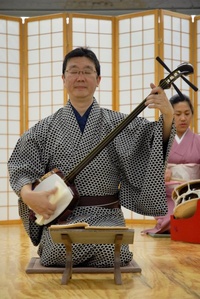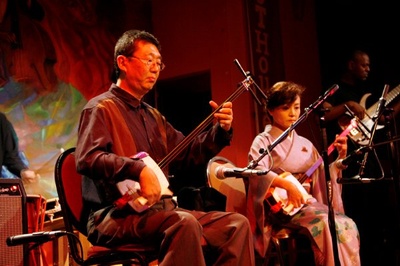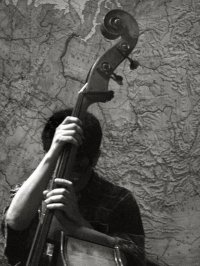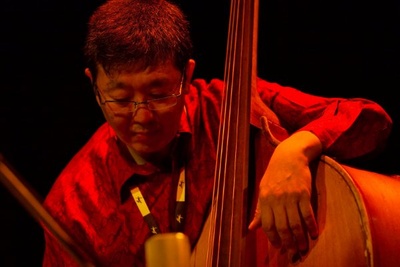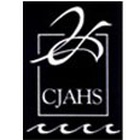Tatsu Aoki remains a prolific artist, composer, musician, filmmaker and educator, contributing to and enriching Chicago’s cultural scene. He works in a wide range of musical genres, ranging from traditional Japanese music to jazz to experimental music. His primary instruments are the bass and the shamisen lute.
He is also an accomplished experimental filmmaker. His biological father, Wahei Hoshino, was a movie producer at Shin Toho Movie Studio in the 1960s and was the reason that Tatsu got into small gauge film making. He studied experimental film making at the School of the Art Institute of Chicago, and currently is a professor at the Film, Video and New Media Department, where he teaches film production and history courses. He has made many experimental short films.
Being born into an artisan family associated with geisha, his first musical identity was associated heavily with the music of the geisha houses. The musical instruments of that environment, the taiko drum and the shamisen lute, were the core roots of his music. In 1977, he moved to Chicago to attend the School of the Art Institute.
He shared with the Chicago Japanese American Historical Society about his musical background and influences:
I was born in Tokyo, Japan into an artisan family called TOYOAKI MOTO, traditionally categorized as OKIYA, meaning a booking and training agent for Geisha ladies in downtown Tokyo’s designated area. While the economy and social environment forced many of those traditional artisan family businesses to close down in the 1960s, I was fortunately able to receive some of the important essence of traditional Tokyo Geisha cultural training and studies at age 4, and became a part of the performing crew in early childhood. The business was organized and managed by my grandmother Aki, a second generation owner of TOYOAKI MOTO. Most of the training I received was from Aki and her disciples.
After my grandmother passed away, I kept the Tokyo music training until my early teens, and then shifted my musical focus to American pop music and experimental music. I was a very active performer during the early ‘70s in the midst of the Tokyo Underground Arts movement. I became a member of the experimental Japanese music ensemble, GINTENKAI, presenting a mixture of traditional music and new western music. After coming to the U.S. in 1977, I studied experimentalism in school. During the late 1980s, I became involved in Chicago's Asian American community and joined the Asian American music movement.
From the environment of my childhood, I inherited the historical and traditional essence of the Tokyo Entertainment district’s musical concepts and basics, and learned the value of flexible creations and applications. With the decline of these special districts in the late 60s and early 70s, Tokyo’s regional entertainment musical concepts also disappeared, and like many other art forms, Tokyo Geisha music had also institutionalized.
One of the most important goals is to preserve the original essence of fluidity and flexibility and to perform the rawness of REAL sound. In organizing Toyoaki Shamisen in Chicago, I have adopted this idea to newer works as well. My main general concern is to present music which evokes a reality of roots and the true quality of my upbringing as a member of a long-lost traditional artisan family which at one time employed a distinctive musical style. It is my pleasure to share the effort of making this unique sound of Tokyo (EDO) Shamisen culture.
Tatsu’s perspective, which he calls “real music,” derives from the folk music of his roots, influenced by the jazz and blues of Chicago. In his vision, reality is fluid, and flexibility is the main theme of his art form. His musical concept, which he refers to as “urban folkloric,” maintains the original essence of his ethnic tradition while incorporating modern musical forms. This musical perspective has been presented in his Taiko/Bass performance, “Basser Live,” a series of duet works with artists such as bassist Malachi Favors, multi-instrumentalists Roscoe Mitchell and Don Moye, world-renowned Pipa virtuoso, Wu Man, and another Chicago legend, Fred Anderson. In 2001, Tatsu created a stronger mixture of the traditional Japanese instrumentation and Jazz when he formed the Taiko drum-driven ensemble, the Miyumi Project. This has become one of the signatures of the contemporary Asian American Jazz music scene in Chicago.
Aoki has produced more than 60 recording projects and over 30 experimental films. His most important ensemble work, “Rooted: Origins of Now,” performed at the Chicago Jazz Festival in 2001, is an elegant and dramatic merger of ancient Japanese music and experimental American jazz. For this he was recognized by the Chicago Tribune as one of the “Chicagoans of the Year.” In 2007, the Asian American Institute gave him the Milestone Award for his contribution to Chicago area arts.
Currently, he serves as an Executive Director of Asian aRts Improv Midwest, where he initiated and managed programs to advance the understanding of Asian American culture and community through the arts. Among his projects are the Annual Chicago Asian American Jazz Festival and the JASC Tsukasa Taiko Legacy arts residency project.
Tatsu Aoki is also working on a documentary film about Japanese Americans who resettled in Chicago after World War Two, “Origins of Now: Stories of the Chicago Nisei.” The film will include archival material, contemporary interviews and some of Tatsu’s original music from “Rooted.”
More information on Tatsu Aoki:
- An article on "Origins of Now: Stories of the Chicago Nisei" http://www.tatsuaoki.com/f_on_090402r.html
- Filmography: http://www.tatsuaoki.com/filmography.html
- Tatsu Aoki website: http://www.tatsuaoki.com/index.html
- Asian Improv Arts Midwest (AIRMW): http://www.airmw.org/
- JASC Tsukasa Taiko - Taiko Legacy: http://taikolegacy.com/
- The Miyumi Project: http://miyumiproject.com/
- Toyoaki Shamisen: http://www.toyoaki.org/
- A study of Tatsu written by Deborah Wong, “Asian/American Improvisation in Chicago: Tatsu Aoki and the ‘New’ Japanese American Taiko”:
Excerpt – “Bassist Tatsu Aoki produces Chicago’s Asian American Jazz Festival. His work often draws on taiko, a form of folkloric Japanese drumming, as well as experimental jazz. Wong views Aoki's activity as a process of constructing a dynamic, transnational Asian American identity. She argues that Aoki takes his status as a ‘Shin Issei’ (a recent Japanese immigrant) as a starting point, but aims to ‘become’ American on his own terms-an aspiration of the contemporary Asian American community at large.”
http://jazzstudiesonline.org/?q=node/383
© 2010 Chicago Japanese American Historical Society


